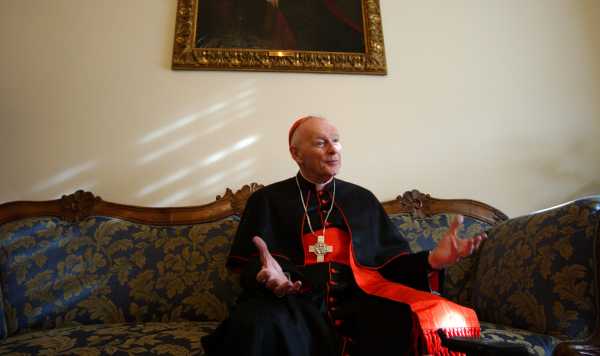Theodore McCarrick became a symbol of the shortcomings of the Catholic Church.

Loading Elevenlabs Text to Speech AudioNative Player…
Theodore McCarrick, the former archbishop of Washington, D.C., passed away on Thursday without much ceremony. The controversial cardinal's departure was overshadowed by the global economic crisis following the imposition of “Liberation Day” tariffs on Wednesday.
How do you write an obituary for a figure as controversial as McCarrick? Do you start at the end, with the elder being defrocked, silenced, and hidden from view after revelations of sexual abuse and misconduct? Or do you start at the beginning, with his protégéship of the sinister and powerful Cardinal Francis Spellman? With his photo ops with America’s political elite? With the extraordinary letter from Cardinal Joseph Ratzinger, who led the Congregation for the Doctrine of the Faith and became the future Pope Benedict XVI? Or with Beau Biden’s funeral?
I met the late cardinal twice, both times for brief encounters. The first time, when I visited my childhood parish, he asked me if I had ever considered becoming a priest—I was 7 or 8. The second time, as my family rushed to catch up with the main group at the annual March for Life, we passed McCarrick’s entourage. My younger brother threw a fit (as usual), and McCarrick gave him a wry blessing. Chez Russo’s opinion of McCarrick was mixed: His sympathy for Democratic politicians, especially those who supported abortion, was objectionable. On the other hand, he publicly defended the Church’s teachings on a host of increasingly unpopular social issues, he supported the archdiocese by ensuring its financial stability and strict governance, he was an active supporter of the Knights of Columbus, and he did a fine job of attracting new priests as vocations fell. By contrast, the neighboring Archdiocese of Baltimore was chronically teetering on the brink of bankruptcy and losing more and more of its priests. (As it is now, on both counts.) Overall, McCarrick was considered to be probably more good than bad. He was canny, competent, politically savvy, and likable.
He had many of the characteristics of the successful man, the traditional model in the Church. This has been criticised in retrospect; Catholics like nothing better than to hear complaints about high-ranking clerics. I am inclined to think that this is a little unfair. The problem was sexual misconduct. People capable of public life are inevitable; if they do their job well, and if you share the mission of the organisation itself, they may even be desirable. Not everyone who works in your civilisation-spanning organisation will be a Gregory the Great. You can also find competence among the inevitable opportunists.
Subscribe Today Get Daily Emails Delivered to Your Inbox Email Address:
It makes sense. The Church has spent the last 60 years or so shedding its secular pomp, its ostentatious wealth, and its pretensions to power. These were once attractions that outweighed the rather bleak prospect of lifelong celibacy. With these gone, there is little incentive for smart, ambitious young people to join the Church. What remains are the sincere believers and ideologues who have proven uninterested in becoming inspiring leaders; those with sinister intentions, such as preying on seminarians; and incompetent, bottom-quintile nonprofit administrators. The razing of the foundations has not so much purified the Church as ensured its hollowing out.
Sourse: theamericanconservative.com






